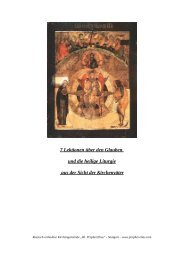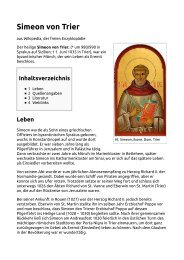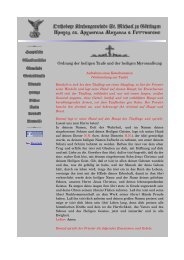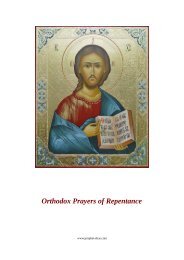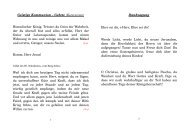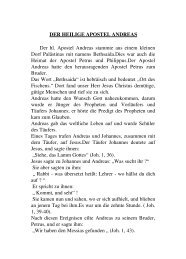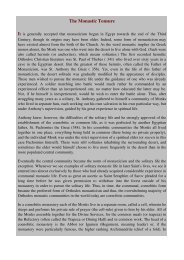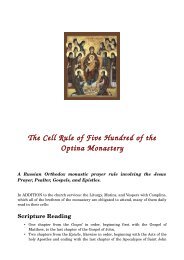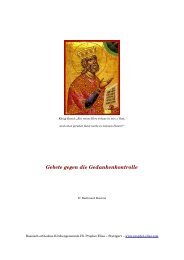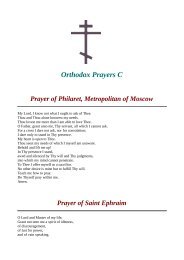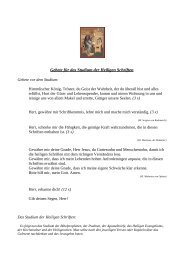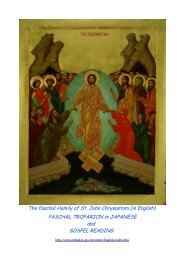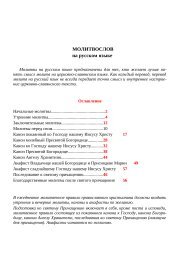Download
Download
Download
Create successful ePaper yourself
Turn your PDF publications into a flip-book with our unique Google optimized e-Paper software.
Nikolayevich [the husbands of the sisters] became strained. Rasputin himself mentioned it in<br />
passing. From a few sentences of his I concluded that he had very likely instilled in the former<br />
emperor the idea that they had too much influence on state affairs and were encroaching on the<br />
emperor’s independence.”<br />
The place that the Montenegrin Grand Duchesses had played in the royal family was now taken by<br />
the young Anya Vyrubova, who was a fanatical admirer of Rasputin. Another of Rasputin’s admirers<br />
was the royal children’s nurse, Maria Vishnyakova. And so Rasputin came closer and closer to the<br />
centre of power…<br />
Contrary to the propaganda of the Masons, Rasputin never had sexual relations with any member of<br />
the Royal Family. Moreover, his influence on the political decisions of the Tsar was much<br />
exaggerated. But he undoubtedly had a great influence on the Tsarina through his ability, probably<br />
through some kind of hypnosis, to relieve the Tsarevich’s haemophilia, a tragedy that caused much<br />
suffering to the Tsar and Tsarina, and which they carefully hid from the general public. It is this<br />
partial success in curing the Tsarevich that wholly explains Rasputin’s influence over the Royal<br />
Family…<br />
Bishop Theophan began to have doubts about Rasputin. These doubts related to rumours that<br />
Rasputin was not the pure man of God he seemed to be. “Rumours began reaching us,” testified<br />
Vladyka, “that Rasputin was unrestrained in his treatment of the female sex, that he stroked them<br />
with his hand during conversation. All this gave rise to a certain temptation to sin, the more so since<br />
in conversation Rasputin would allude to his acquaintance with me and, as it were, hide behind my<br />
name.”<br />
At first Vladyka and his monastic confidants sought excuses for him in the fact that “we were<br />
monks, whereas he was a married man, and that was the reason why his behaviour has been<br />
distinguished by a great lack of restraint and seemed peculiar to us… However, the rumours about<br />
Rasputin started to increase, and it was beginning to be said that he went to the bathhouses with<br />
women… It is very distressing… to suspect [a man] of a bad thing…”<br />
Rasputin now came to meet Vladyka and “himself mentioned that he had gone to bathhouses with<br />
women. We immediately declared to him that, from the point of view of the holy fathers, that was<br />
unacceptable, and he promised us to avoid doing it. We decided not to condemn him for<br />
debauchery, for we knew that he was a simple peasant, and we had read that in the Olonets and<br />
Novgorod provinces men bathed in the bathhouses together with women, which testified not to<br />
immorality but to their patriarchal way of life… and to its particular purity, for… nothing<br />
[improper] was allowed. Moreover, it was clear from the Lives of the ancient Byzantine holy fools<br />
Saints Simeon and John [of Edessa] that they both had gone to bathhouses with women on purpose,<br />
and had been abused and reviled for it, although they were nonetheless great saints.” The example<br />
of Saints Simeon and John was to prove very useful for Rasputin, who now, “as his own<br />
justification, announced that he too wanted to test himself – to see if he had extinguished passion in<br />
himself.” But Theophan warned him against this, “for it is only the great saints who are able to do<br />
it, and he, by acting in this way, was engaging in self-deception and was on a dangerous path.”<br />
To the rumours about bathhouses were now added rumours that Rasputin had been a khlyst<br />
sectarian in Siberia, and had taken his co-religionists to bathhouses there. Apparently the Tsar heard<br />
these rumours, for he told the Tsarina not to receive Rasputin for a time. For the khlysts, a sect that<br />
indulged in orgies in order to stimulate repentance thereafter, were very influential among the<br />
intelligentsia, especially the literary intelligentsia, of the time.<br />
It was at that point that the former spiritual father of Rasputin in Siberia, Fr. Makary, was<br />
summoned to Tsarskoe Selo, perhaps on the initiative of the Tsarina. On June 23, 1909 the Tsar<br />
recorded that Fr. Makary, Rasputin and Bishop Theophan came to tea. There it was decided that<br />
Bishop Theophan, who had doubts about Rasputin, and Fr. Makary, who believed in him, should go<br />
to Rasputin’s house in Pokrovskoye and investigate.



